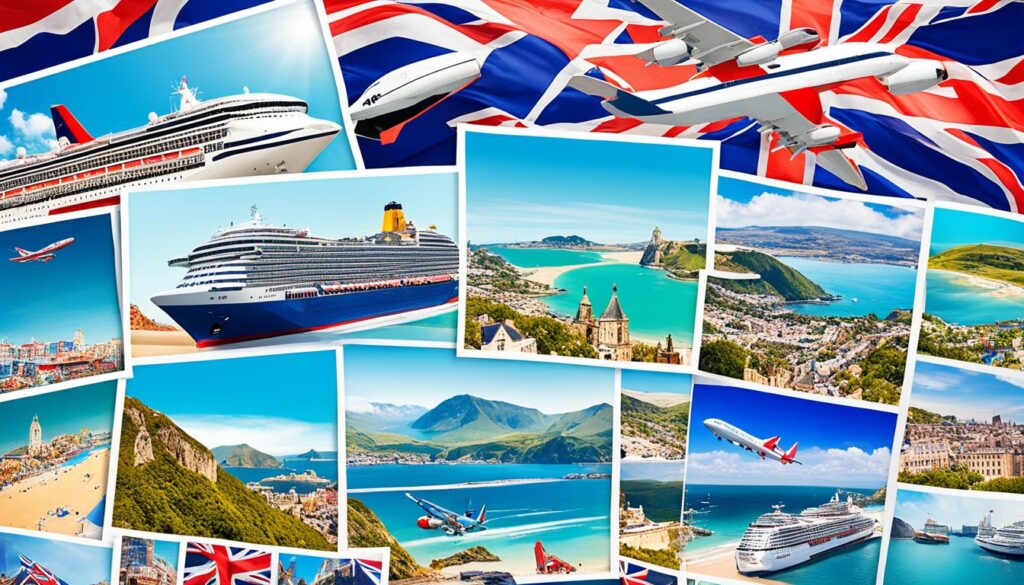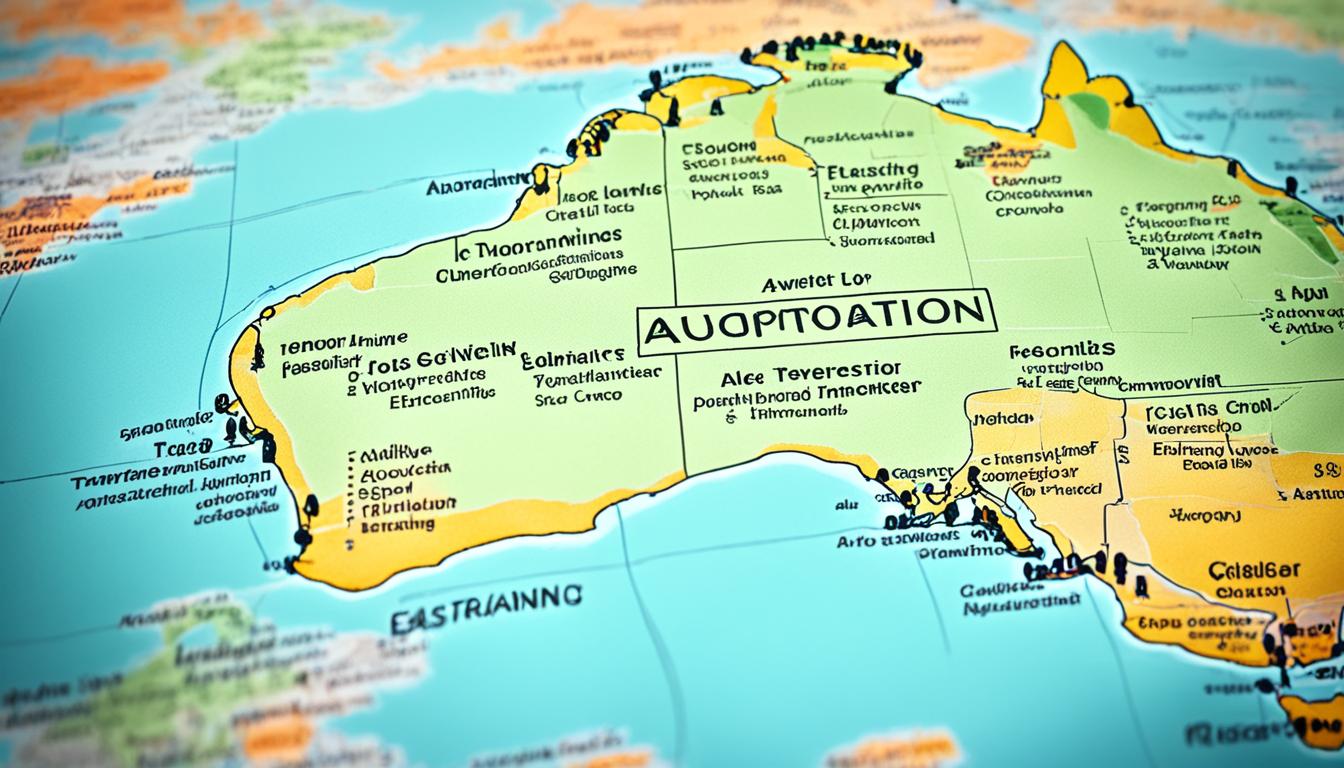
Welcome to our comprehensive guide on how to become a travel agent in the UK. Whether you’re starting from scratch or looking to switch careers, we have all the information you need to enter the travel industry and begin your journey as a travel agent.
In this guide, we will take you through the step-by-step process, from understanding the travel industry and researching training courses to obtaining certification and gaining practical experience through apprenticeships. We’ll also provide insights on developing essential travel agent skills, building a network in the industry, creating a professional travel agent resume, and navigating the job search and interview process.
So, if you’re passionate about travel and dream of helping others create unforgettable experiences, this guide is for you. Let’s dive in and explore the exciting opportunities awaiting you in the travel industry!
Key Takeaways:
- Starting a career as a travel agent in the UK requires proper training and certification.
- Research and choose the right travel agent training courses to develop the necessary skills and knowledge.
- Obtaining travel agent certification can enhance your credibility and open doors to more job opportunities.
- Gain practical experience through travel agency apprenticeships to build a strong foundation in the industry.
- Develop essential skills such as excellent communication, organization, and sales abilities to succeed as a travel agent.
Understanding the Travel Industry
Before embarking on your journey to become a travel agent, it is crucial to gain a deep understanding of the travel industry. This section will delve into the qualifications required, the potential career paths available, and the skills and attributes that are highly valued in the industry.
Qualifications in the Travel Industry
A career in the travel industry often requires specific qualifications that showcase your expertise and knowledge. While formal education in travel-related fields, such as tourism or hospitality management, can be advantageous, it is not always mandatory. However, acquiring relevant certifications can significantly enhance your employability and credibility as a travel agent.
Common travel industry qualifications include:
- International Air Transport Association (IATA) certifications
- Travel and Tourism diplomas or certifications
- Cruise Line International Association (CLIA) certifications
- Destination-specific certifications (e.g., Certified Travel Counselor for specific regions)
Earning these qualifications demonstrates your commitment to professional development and industry knowledge, making you a competitive candidate in the travel job market.
Potential Career Paths
The travel industry offers a wide range of career paths, allowing you to specialize in different areas based on your interests and strengths. Here are some common career paths within the travel industry:
- Leisure Travel Agent: As a leisure travel agent, you will assist individuals and families in planning and booking their leisure trips, such as vacations and honeymoons.
- Corporate Travel Agent: Corporate travel agents handle the travel needs of businesses and organizations, coordinating flights, accommodations, and transportation for business trips.
- Tour Guide: Tour guides lead groups on sightseeing tours, providing information and commentary about various destinations and attractions.
- Destination Specialist: Destination specialists focus on specific regions or countries, becoming experts in the local culture, attractions, and travel logistics.
- Travel Consultant: A travel consultant provides personalized advice and recommendations to clients, helping them plan and create customized travel experiences.
These are just a few examples of the varied career paths available in the travel industry. Exploring your interests and strengths will help you determine the most suitable career path to pursue.
Key Skills and Attributes
Besides qualifications, possessing certain skills and attributes is vital for success in the travel industry. These include:
- Excellent communication skills to interact effectively with clients and suppliers.
- Strong organizational abilities to manage travel arrangements and logistics efficiently.
- Attention to detail to ensure accuracy in booking flights, accommodations, and other travel-related services.
- Sales and negotiation skills to promote travel packages and secure the best deals for clients.
- Adaptability and flexibility to handle unexpected changes and challenges.
- A passion for travel and a desire to create memorable experiences for clients.
Developing and honing these skills will set you apart in the travel industry, increasing your value as a travel agent.
Researching Travel Agent Training Courses
To become a travel agent in the UK, it is essential to undergo proper training. The travel industry is dynamic and constantly evolving, requiring travel agents to have the latest knowledge and skills to provide excellent service to their clients. In this section, we will explore the various training courses available that will equip you with the necessary expertise to succeed in the travel industry.
There are two main options for travel agent training courses: in-person and online. In-person courses allow for hands-on learning and direct interaction with industry professionals. These courses are often held at dedicated training centers or vocational institutions, providing a comprehensive curriculum that covers all aspects of being a travel agent. In-person courses can range from a few days to several weeks, depending on the depth of the training.
On the other hand, online courses offer flexibility and convenience for aspiring travel agents. These courses can be accessed from anywhere, allowing you to learn at your own pace and fit the training into your schedule. Online courses typically include video lectures, interactive exercises, and assessments to ensure a comprehensive learning experience. Some online courses also offer virtual simulations that mimic real-life travel agent scenarios, enhancing your practical skills.
Benefits of In-Person Training Courses:
- Direct interaction with industry professionals
- Hands-on learning experience
- Comprehensive curriculum
- Opportunity to network with fellow trainees
Benefits of Online Training Courses:
- Flexibility and convenience
- Learn at your own pace
- Accessible from anywhere
- Interactive learning materials
When selecting a training course, consider your learning style, schedule, and budget. Research different training providers and read reviews or testimonials from past students to ensure the quality and effectiveness of the course. It’s also beneficial to check if the course is accredited by industry organizations or recognized by travel agencies, as this can enhance your chances of securing employment.
Investing in travel agent training courses will not only equip you with the necessary skills and knowledge to excel in the industry but also demonstrate your commitment and dedication to potential employers. Take the time to explore different training options and choose the course that best aligns with your goals and aspirations as a travel agent.
Obtaining Travel Agent Certification
In addition to training, obtaining travel agent certification can enhance your credibility and open doors to more job opportunities. Many employers in the travel industry prefer to hire certified travel agents who have demonstrated their knowledge and proficiency in the field. Travel agent certification is a testament to your expertise and dedication, making you stand out among other candidates.
There are several reputable organizations that offer travel agent certification programs. These programs are designed to cover key aspects of the travel industry, including destination knowledge, travel technology, customer service, sales, and marketing. By obtaining certification, you demonstrate your commitment to professionalism and excellence in the travel industry.
Here are some popular travel agent certification programs:
- American Society of Travel Advisors (ASTA) Certified Travel Advisor (CTA)
- International Air Transport Association (IATA) Travel and Tourism Consultant
- The Travel Institute Certified Travel Associate (CTA) and Certified Travel Counselor (CTC)
These certification programs often require you to complete specific coursework, pass exams, and have a certain level of industry experience. Each certification program has its own requirements and benefits, so it’s important to research and choose the one that aligns with your career goals.
To achieve travel agent certification, you will typically need to:
- Complete the required coursework or training program.
- Pass the certification exam.
- Meet any additional experience or membership requirements.
By earning travel agent certification, you not only gain valuable knowledge and industry recognition, but you also increase your chances of securing desirable job opportunities and advancing in your travel agent career.
Gaining Practical Experience through Apprenticeships
Apprenticeships provide an invaluable opportunity to gain practical experience in the travel industry while working alongside seasoned professionals. By immersing yourself in real-world scenarios and learning from industry experts, you can develop the skills and knowledge necessary to excel as a travel agent.
Travel agencies offer a variety of apprenticeship programs tailored to aspiring travel agents. These programs typically combine on-the-job training with classroom learning, providing a comprehensive understanding of the travel industry and its operations.
During your apprenticeship, you will have the chance to work in different departments of the travel agency, such as sales, customer service, and tour operations. This exposure will allow you to gain hands-on experience and insight into the various aspects of the travel business.
Apprenticeships offer several advantages for individuals looking to kickstart their career as a travel agent:
- Practical Experience: Apprenticeships provide you with the opportunity to apply theoretical knowledge in practical settings, helping you develop essential skills and gain confidence in your abilities.
- Industry Connections: By working closely with experienced professionals, you can build valuable connections within the travel industry. These connections may open doors to future job opportunities and mentorship.
- Employability: Apprenticeships enhance your employability by demonstrating your commitment to learning and gaining relevant experience. This can set you apart from other candidates when applying for travel agent positions.
To give you a better idea of what to expect during a travel agency apprenticeship, here is a breakdown of the typical responsibilities and learning opportunities:
Responsibilities:
- Assisting with customer inquiries and providing exceptional customer service
- Creating and managing travel itineraries for clients
- Researching and booking flights, accommodations, and other travel arrangements
- Supporting the sales team in promoting travel packages and services
- Collaborating with colleagues to organize group travel or corporate events
Learning Opportunities:
- Understanding the travel agency’s booking systems and software
- Developing product knowledge about different destinations, attractions, and travel products
- Learning sales techniques and strategies to effectively promote travel packages
- Gaining insights into travel industry regulations and policies
| Apprenticeship Program | Duration | Key Benefits |
|---|---|---|
| Travel Agency Apprenticeship | 1-2 years |
|
Embark on an apprenticeship journey with a reputable travel agency, and you’ll gain the practical skills, industry knowledge, and connections needed to launch a successful career as a travel agent.
Developing Essential Travel Agent Skills
Becoming a successful travel agent requires a diverse set of skills that enable you to provide exceptional service to your clients. From effective communication to strong organizational and sales abilities, mastering these essential skills is crucial to thrive in the travel industry.
Let’s explore each of these skills in detail and discuss strategies to develop and strengthen them:
1. Communication Skills:
As a travel agent, you’ll interact with clients, suppliers, and colleagues on a daily basis. Effective communication skills are essential to understand and articulate your clients’ travel preferences, negotiate with suppliers, and provide accurate and engaging information. Developing active listening, verbal and written communication, and interpersonal skills are key to delivering exceptional customer experiences.
2. Organizational Skills:
Being organized is vital in the fast-paced travel industry. You’ll need to manage multiple itineraries, bookings, and client requests simultaneously. Strong organizational skills will enable you to stay on top of deadlines, handle complex logistics, and maintain a high level of efficiency. Effective time management, attention to detail, and the ability to prioritize tasks are fundamental to succeed in this role.
3. Sales Abilities:
Travel agents are sales professionals who market and sell travel products and services. Developing strong sales abilities will help you effectively promote travel packages, upsell additional services, and close deals. Enhance your persuasion skills, product knowledge, and customer service approach to provide personalized and enticing travel options that meet your clients’ needs and exceed their expectations.
“Effective communication, strong organizational skills, and persuasive sales abilities are essential for travel agents to deliver exceptional service and enhance client satisfaction.”- Travel Industry Expert
By investing time and effort into developing these essential travel agent skills, you’ll position yourself as a competent and trustworthy professional in the industry.
| Skill | Description | Development Strategies |
|---|---|---|
| Communication Skills | Effective communication with clients, suppliers, and colleagues. |
|
| Organizational Skills | Managing multiple itineraries, bookings, and deadlines. |
|
| Sales Abilities | Promoting travel packages, upselling, and closing deals. |
|
Remember, practice and continuous learning are essential for honing these skills and staying competitive in the ever-evolving travel industry.
Building a Network in the Travel Industry
Networking plays a crucial role in the travel industry, allowing you to discover exciting job opportunities and stay updated with the latest trends. By building a strong professional network, you can connect with industry experts, gain valuable insights, and create lasting partnerships. Here are some effective ways to establish and grow your network:
- Attend Trade Fairs: Participating in travel trade fairs and exhibitions provides a fantastic opportunity to engage with professionals from various sectors of the industry. These events often bring together travel agencies, airlines, hotels, and tourism boards, making them an ideal platform to network and establish valuable connections. Be sure to exchange contact information and follow up with individuals you meet.
- Join Industry Associations: Becoming a member of industry associations, such as the Association of British Travel Agents (ABTA) or the International Air Transport Association (IATA), can significantly enhance your networking opportunities. These associations often host events, conferences, and workshops where you can meet fellow travel professionals and stay updated with industry developments.
- Utilize Online Platforms: In today’s digital age, online platforms play a pivotal role in networking. Join social media groups and forums dedicated to the travel industry, such as LinkedIn groups or professional travel agent communities. Engage in discussions, share your knowledge, and connect with like-minded individuals. Remember to maintain a professional and respectful tone in all your interactions.
By actively networking, you can position yourself within the travel industry and establish relationships that can lead to exciting job opportunities and valuable partnerships.

Creating a Professional Travel Agent Resume
When applying for travel agent positions, a well-crafted resume is essential to showcase your qualifications and stand out from other applicants. Your resume should effectively highlight your skills, experiences, and certifications relevant to the travel industry. Here are some tips to create a professional travel agent resume:
1. Start with a Clear and Concise Objective Statement
Begin your resume with a strong objective statement that clearly states your career goals and how you plan to contribute to the travel industry. Tailor your objective statement to align with the specific job you are applying for.
2. Highlight Your Relevant Skills and Experiences
Emphasize your travel-related skills and experiences that make you a qualified candidate for the position. Include information about any relevant certifications or training you have completed, such as courses in travel management or customer service.
- Excellent knowledge of travel destinations, including popular tourist attractions and local customs.
- Proficiency in using travel industry software, such as GDS (Global Distribution System) platforms.
- Demonstrated ability to provide exceptional customer service and handle customer inquiries and complaints.
- Proven track record in sales, with the ability to effectively promote and sell travel packages and services.
- Strong organizational and time management skills, with the ability to handle multiple tasks and prioritize effectively.
3. Include Relevant Work Experience
List your previous work experience in the travel industry, highlighting roles where you have gained valuable skills and knowledge. If you are new to the industry, include any relevant internships or volunteer experiences that showcase your passion for travel and customer service.
4. Showcase Your Educational Background
Include your educational qualifications, such as degrees or diplomas in travel and tourism, hospitality management, or a related field. Highlight any academic achievements or relevant coursework that further strengthen your candidacy.
5. Tailor Your Resume to Each Job Application
Customize your resume for each travel agent position you apply for. Analyze the job description and requirements, and tailor your resume to highlight the specific skills and experiences that make you a strong fit for the role.
6. Use a Professional Format and Design
Ensure that your resume is well-organized, visually appealing, and easy to read. Use clear headings and bullet points to highlight key information. Keep the design simple and professional, avoiding excessive colors or graphics that may distract from the content.
7. Proofread and Edit Carefully
Before submitting your resume, proofread it thoroughly to eliminate any spelling or grammatical errors. Ensure that all the information is accurate and up to date. Consider having a trusted friend or mentor review your resume for feedback and suggestions.
By following these tips, you can create a professional travel agent resume that effectively showcases your skills, experiences, and qualifications. Remember to tailor your resume to each job application, highlighting the specific attributes that make you a strong candidate for the position.
Navigating the Job Search Process
When it comes to finding job opportunities as a travel agent, the process can be competitive. However, with the right strategies, you can navigate the job search process effectively and increase your chances of landing your dream position. Here are some key strategies to consider:
Utilize Online Job Boards
Online job boards are a valuable resource for finding travel agent job opportunities. Visit popular job sites and filter your search to include keywords like “travel agent” or “travel consultant” to narrow down your options. Take the time to carefully read through job descriptions and requirements to ensure you meet the qualifications and can tailor your application accordingly.
Reach Out to Travel Agencies Directly
Don’t wait for job openings to be posted on job boards. Proactively reach out to travel agencies directly to inquire about potential job opportunities. Research local agencies and send them a well-crafted email expressing your interest and qualifications. Make sure to highlight your relevant skills and experiences that align with their needs.
Leverage Your Network
Your network can be a valuable asset in your job search as a travel agent. Reach out to friends, family, former colleagues, and industry connections to let them know you are actively seeking job opportunities. Attend industry events, trade fairs, and networking events to expand your network and increase your chances of hearing about job openings through word-of-mouth.
“Networking is crucial when searching for job opportunities in the travel industry. Building strong connections and maintaining relationships can lead to valuable job leads and recommendations.”
By combining these strategies, you can enhance your job search process and increase your chances of finding exciting travel agent job opportunities. Remember, it’s important to tailor your applications and showcase your skills and qualifications specific to each position you apply for. Stay persistent, remain confident, and continue to refine your approach until you land the job that aligns with your career goals.
Interviewing for a Travel Agent Position
Securing an interview as a travel agent is an exciting step towards launching your career in the travel industry. To ensure you make a strong impression on potential employers, thorough preparation is key. In this section, we will provide you with essential tips on how to ace travel agent interviews, including common interview questions and strategies to showcase your unique value as a candidate.
Preparing for Success
Preparing for a travel agent interview involves researching the company you are applying to and familiarizing yourself with their services, target audience, and values. This will enable you to tailor your responses to showcase your alignment with their goals and demonstrate your understanding of the industry.
Additionally, it is important to review common interview questions and develop concise and compelling responses. Consider preparing examples that highlight your skills in customer service, attention to detail, problem-solving, and sales. These qualities are highly valued in the travel industry.
Showcasing Your Unique Value
During the interview, it is crucial to differentiate yourself from other candidates by highlighting your unique value and relevant experiences. Emphasize any certifications or training you have obtained, as well as any previous work or volunteer experience related to travel or customer service. This will demonstrate your passion for the industry and your commitment to providing exceptional service to clients.
Moreover, be prepared to discuss how you handle challenging situations and solve problems promptly. Travel agents often encounter unexpected circumstances and must be able to adapt and find solutions quickly. By showcasing your problem-solving skills, you will demonstrate your ability to handle the demands of the role effectively.
Common Interview Questions
- Why do you want to work as a travel agent?
- How do you handle difficult clients?
- Can you provide an example of a time when you went above and beyond to meet a client’s needs?
- What strategies do you use to stay informed about travel trends and destinations?
- How do you handle stressful situations and prioritize tasks?
Preparing thoughtful responses to these common interview questions will demonstrate your readiness and commitment to excel as a travel agent.
| Interview Tips | Key Takeaways |
|---|---|
| Research the company and industry | Gain a thorough understanding of the company’s services, target audience, and industry trends to tailor your responses. |
| Prepare concise and compelling responses | Develop examples and anecdotes that showcase your skills and experiences in providing exceptional customer service, problem-solving, and attention to detail. |
| Highlight your unique value | Emphasize relevant certifications, training, and previous work experience to differentiate yourself from other candidates. |
| Showcase your problem-solving skills | Illustrate your ability to handle challenging situations and find solutions promptly, as travel agents often encounter unexpected circumstances. |
By following these tips and thoroughly preparing for your travel agent interviews, you can increase your chances of impressing potential employers and securing your dream job in the travel industry.
Continuing Education and Professional Growth
The travel industry is a dynamic field that constantly evolves with changing trends and advancements. As a travel agent, it is crucial to stay up to date with the latest knowledge and skills in order to provide the best service to your clients. Continual learning and professional growth are key to thriving in this industry.
There are several opportunities available for travel agents to enhance their qualifications and expand their expertise. Consider the following avenues for continuing education:
- Industry Conferences: Participating in industry conferences allows you to connect with industry experts, stay informed about the latest developments, and network with other travel professionals. Attend workshops and seminars to gain insights into emerging travel trends and new technologies.
- Advanced Certifications: Pursuing advanced certifications in specialized areas of the travel industry can elevate your expertise and credibility. These certifications demonstrate your commitment to professional growth and distinguish you as a highly qualified travel agent. Examples include the Certified Travel Associate (CTA), Certified Travel Counselor (CTC), and Destination Specialist certifications.
- Online Courses: Many reputable organizations offer online courses specifically designed for travel agents. These courses cover a wide range of topics such as destination knowledge, sales techniques, and customer service skills. Online learning provides flexibility and allows you to study at your own pace.
Continually expanding your knowledge and skills not only helps you provide exceptional service to your clients but also boosts your career prospects. By staying updated with industry advancements, you can offer unique experiences and personalized recommendations, ultimately setting yourself apart from competitors.
“Continual learning and professional growth are essential for travel agents to stay current in a rapidly changing industry.”
Investing in your professional development demonstrates your dedication to excellence and ensures that you remain competitive in the travel industry.
Now, let’s take a look at some statistics related to travel industry qualifications:
| Statistic | Percentage |
|---|---|
| Travel agents with industry certifications | 85% |
| Travel agents attending industry conferences | 92% |
| Travel agents enrolled in online courses | 78% |
The data clearly highlights the significance of continuing education and professional growth in the travel industry. By investing in your qualifications and staying current with industry trends, you can position yourself as a trusted and knowledgeable travel agent.

Navigating Challenges and Building a Successful Travel Agent Career
Becoming a travel agent is an exciting and rewarding career choice, but it is not without its challenges. In this section, we will explore some of the common challenges faced by travel agents and provide valuable guidance on how to overcome them, allowing you to build a successful and fulfilling career in the travel industry.
Facing the Competition
With the travel industry growing rapidly, competition among travel agents has become fierce. To stand out from the crowd and become a sought-after travel consultant, you need to continuously update your skills, stay informed about the latest travel trends, and provide exceptional customer service.
Investing time in ongoing professional development and acquiring niche knowledge can give you a competitive edge. Attend industry conferences, webinars, and workshops to stay up to date with industry developments and build a network of professionals who can offer support and mentorship.
Building Trust with Clients
Establishing trust with clients is vital for a successful travel agent. Clients rely on you to plan their dream vacations, so it’s essential to build strong relationships based on trust and deliver exceptional service.
One effective way of building trust is by providing authentic, personalized recommendations based on your expertise and understanding of your clients’ preferences. Listen carefully to their needs and desires, and tailor your offerings accordingly. Going the extra mile to exceed their expectations will not only foster trust but also lead to repeat business and referrals.
Adapting to Industry Changes
The travel industry is constantly evolving, with new technologies, travel restrictions, and consumer demands shaping the landscape. As a travel consultant, it’s crucial to stay adaptable and open to learning new skills.
Keep abreast of industry trends and embrace digital tools that can enhance your productivity and streamline your operations. Leverage social media platforms and online travel resources to expand your reach and connect with potential clients.
Managing Client Expectations
Managing client expectations can be challenging, as travelers often have high expectations for their vacations. Your role as a travel consultant is to strike a balance between providing a magical experience and setting realistic expectations.
Clearly communicate with your clients about the limitations and possibilities of their travel plans. Be transparent about any potential challenges they may face and provide alternative solutions. Your expertise and honest approach will help manage expectations and build credibility.
Dealing with Unexpected Situations
In the travel industry, unexpected situations can arise, such as flight cancellations, lost luggage, or natural disasters. As a travel consultant, it’s crucial to remain calm, composed, and solution-oriented in such circumstances.
Build a network of reliable contacts within the industry, such as airline representatives and hotel managers, who can assist you during emergencies. Stay updated on travel insurance policies and be prepared to guide your clients through any unforeseen events, offering reassurance and support.
Remember, challenges are an inherent part of any career, and overcoming them is what shapes you into a resilient and successful travel consultant. With the right mindset, dedication to continuous learning, and unwavering commitment to exceptional service, you can navigate these challenges and build a thriving career in the travel industry.
Conclusion
In conclusion, becoming a travel agent in the UK is an exciting and rewarding career choice. It requires dedication and a commitment to continuous learning. By following the comprehensive guide we have provided, you will gain the necessary knowledge and skills to embark on your journey as a successful travel agent.
Remember that training and certification are essential to enhance your credibility and open doors to more job opportunities. Take advantage of the various travel agent training courses available, both in-person and online, to equip yourself with the expertise needed in the industry.
Additionally, building a professional network is crucial for finding job opportunities and staying updated with the latest trends. Attend trade fairs, join industry associations, and utilize online platforms to expand your connections and discover new avenues for growth.
As you navigate the challenges that may arise in your travel agent career, always remain resilient and adaptable. Continuously seek further education and professional development opportunities to stay ahead of the curve in the ever-evolving travel industry. With perseverance and a passion for travel, you can build a successful and fulfilling career as a travel agent in the UK.





